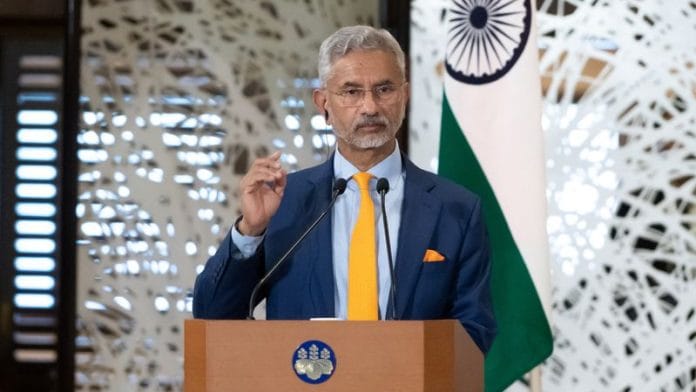New Delhi: India is not closed to doing business with China, External Affairs Minister S. Jaishankar said Tuesday, but highlighted that the issue was in which sector and on what terms.
The foreign minister’s comments at a conference in Berlin comes at a time when China has pipped the US to become New Delhi’s largest trading partner in goods in 2023-2024 despite strained ties since the 2020 border clashes.
Though India subsequently put a squeeze on visas, commercial activity between New Delhi and Beijing has only grown these last years.
Addressing the Annual Ambassadors’ Conference, Jaishankar said China was the second-largest economy in the world and was a premium manufacturer. “We are not closed to business from China… There is nobody who can say I will not do business with China. I think the issue is which sectors do you do business in and on what terms you do business. It is far more complicated than a black and white binary answer,” he added.
On the Russia-Ukraine war, the foreign minister reiterated that a solution would not be found on the battlefield and that both countries had to negotiate an end to the conflict. He added India was willing to give “advice” to either of them if requested.
Record trade between India & China
Trade in goods between the two neighbours stood at $118.41 billion at the end of the 2024 financial year, with Beijingregaining its spot as New Delhi’s top trading partner after three years. Out of this, Indian imports from China were $101.74 billion, while its exports roughly $16.66 billion.
Trade has consistently crossed the $100-billion mark for three years, despite political tension following the Galwan clashes in May 2020, which saw a significant curb on visas to Chinese nationals—from nearly 200,000 in 2018 to 5,500 in 2024.
Direct passenger flights, which were suspended since the start of the COVID-19 pandemic, have not been restored either, though cargo flights have continued.
But trade has steadily flourished with India importing an increasing amount of electronic equipment, mobile parts, laptops, lithium batteries, steel and iron.
India, however, has distanced itself from Chinese 5G technology, which has come under international scrutiny over cybersecurity issues. Several countries including the US, UK and Germany, have restricted the use of or banned purchases of such technology from companies like Huawei and ZTE.
On this issue, Jaishankar said India decided to become self-sufficient in the 5G technology because national security was important, however costly.
“We for a variety of reasons decided we would ourselves take a plunge in 5G. Till that point of time, 5G technology was either European or Chinese… there was also Korean… Telecom means security…Yes, it looks costly up front, but then you might want to ask yourself what is really the cost of security?” he said.
EU-India trade agreement a ‘win-win’
The minister’s visit comes about a month before the next round of the India-Germany Intergovernmental Consultation is expected in the second half of October. India is set to host German Chancellor Olaf Scholz and a large ministerial delegation.
On the agenda is taking stock of the Indo-German Partnership for Green and Sustainable Development (GSDP). The programme aims to see Euro 10 billion in investments by Germany into various sectors including public transport and renewable energy. Euro 2.6 billion has been allocated till 2023 since the partnership was announced the year before.
Both Jaishankar and his German counterpart Annalena Baerbock batted for a trade agreement between the European Union (EU) and India—one that has been in the works since 2007 in one form or the other but is yet to be finalised.
“We know that it needs a push with regards to an EU-India trade agreement. This is also something we are heavily working on… It is a win-win situation. We have the potential of estimated growth of up to 50 percent in trade,” said Baerbock at the Ambassadors’ Conference.
The German foreign minister added: “Why we believe it is so important, is not just about our economies but showing that trade and trade relations and also with regards to trade agreements between democracies and the biggest democracy in the world [India] and the European Union – a democracy of 27 [countries]–is maybe also more successful than partnerships with other systems in the world.”
In December last year, the Ambassador of the European Union to India, Herve Delphin, told ThePrint that both sides were confident of reaching an agreement. Since then, India has held a general election, as has the EU.
(Edited by Tikli Basu)
Also read: India and Singapore sign key agreements during Modi’s visit, a look at what these are






